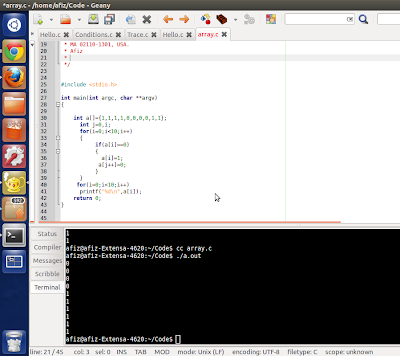/* LinkedList.c: this program is implementation of LinkedList in C. Date: 02/10/2013. */ #include<stdio.h> #include<string.h> void CreateNode(); void InsertElements(); void DisplayElements(); void DeleteElement(int a); typedef struct { int data; struct Node *next; }Node; typedef Node *List; List head,tail,temp; int main() { int choice,data; temp =NULL; head =NULL ; tail =head; while(1){ printf("==Linked List Menu==\n1.Insert Element\n2.Display\n3.Delete\n4.Exit\n"); scanf("%d",&choice); switch(choice) { case 1: InsertElements(); break; case 2: DisplayElements(); break; case 3: printf("Enter the number that you want to delete\n"); scanf("%d",&data); DeleteElement(data); break; default: printf("Thanks for using My programming ..\n"); exit(0); } }// end of infinite loop return 0; } void CreateNode() { int data; printf("Enter your element\n"); scanf("%d",&data); temp = (List)malloc(sizeof(Node)); temp->data = data; temp->next =NULL; } void InsertElements() { CreateNode(); if(head == NULL) { head = temp; tail =head; } else { tail->next = temp; tail = tail->next; } } void DisplayElements() { if(head!=NULL) { printf("Elements===>\n"); for(temp =head; temp!= NULL ; temp = temp->next) { printf("%d\t",temp->data); } printf("\n"); } else { printf("Your Linked List Empty\n"); } } void DeleteElement(int a) { if(head!=NULL) { if(head->data == a) { head = head->next; } else{ tail = head; temp = head->next; int found =0; while(temp !=NULL) { if(temp->data ==a) { tail->next = temp->next; printf("element is found\\deleted\nPlease use option 2 to see remaining"); found =1; break; } else { tail = temp; temp = temp->next; } } if(!found) printf("element is not present\n"); } } else { printf("Your Linked List Empty\n"); } }
Tuesday, October 1, 2013
Linked List Program in C
Friday, August 23, 2013
Monday, March 11, 2013
Sunday, March 10, 2013
Functions in C examples
A function provides a convenient way to encapsulate some computation, which can then be used without worrying about its implementation. With properly designed functions, it is possible to ignore how a job is done; knowing what is done is sufficient. C makes the sue of functions easy, convenient and efficient; you will often see a short function defined and called only once, just because it clarifies some piece of code.
A function definition Syntax:
return-type function-name(parameter declarations, if any)
{
declarations
statements
}
Example:
/*
power.c: This program will give you brief idea about functions.
Author: Afiz S
Date: 11/08/10
*/
#include
int power(int a, int b); //prototype of the function.
main()
{
int a,b;
printf("Enter your 2 number base and exponent\n");
scanf("%d%d",&a,&b);
printf("%dpower %d is = %d\n",a,b,power(a,b)); // calling function.
}
int power(int a, int b) // function defination
{
int i,base=a;
for(i=1;i
{
//printf("%d\n",a);
a=a*base;
}
return a;
}
C format specifiers
| Format Specifiers in C | |
| %i or %d | int |
| %c | char |
| %f | float |
| %lf | double |
| %s | string |
| %hi | short |
| %ld | long int |
| %d,%hu | unsinged short |
| %u | unsinged int |
- \n (newline)
- \t (tab)
- \v (vertical tab)
- \f (new page)
- \b (backspace)
- \r (carriage return)
Format Specifier for int and short in C example
/*
* FormatSpecifiers.c
* Copyright 2013 Afiz <afiz@afiz-Extensa-4620>
*/
#include <stdio.h>
int main(int argc, char **argv)
{
int a =109990909;
short b = 23;
printf("%d,%hi\n",a,b);
return 0;
}
Subscribe to:
Posts (Atom)

